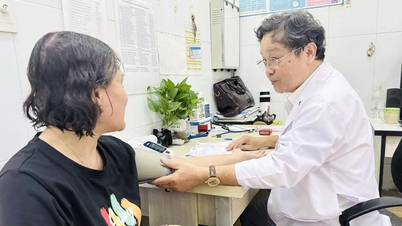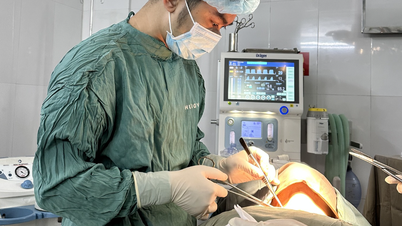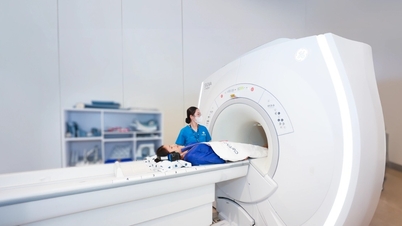Just one month after the miscarriage at the 20th week, Ms. KV (35 years old) was suddenly hospitalized at the Family Hospital ( Da Nang ) due to massive vaginal bleeding, bright red in color, accompanied by small blood clots. Although she did not have a fever or severe abdominal pain, she was constantly exhausted, dizzy and lightheaded.

Dr. Nguyen Thi Huyen My examined Ms. V before discharge.
However, another abnormality was discovered: a complex tubular structure in the uterine muscle with turbulent, high-velocity flow, which was a sign of suspected uterine arteriovenous fistula. To determine exactly, the patient was ordered to have an abdominal CT scan with contrast. The results recorded an arteriovenous fistula located in the uterine body, measuring about 4.5 x 4.7 cm.
According to Dr. Nguyen Thi Thanh Loan - Head of Obstetrics and Gynecology Department, Family Hospital, uterine arteriovenous fistula is an abnormal connection between the blood vessels of the uterus. The most common symptom is abnormal vaginal bleeding. Although rare, the disease can cause massive bleeding, especially in women of reproductive age.
“If not detected and treated properly, the patient may face the risk of having to have a hysterectomy to control bleeding, affecting the ability to conceive, physical and mental health,” said Dr. Nguyen Thi Thanh Loan.
Faced with the risk of severe progression, the Obstetrics Department team coordinated with the Family Hospital's Vascular Interventionalists to come up with the optimal treatment plan. After a multidisciplinary consultation, the doctors agreed to choose selective uterine artery occlusion under the digital subtraction angiography (DSA) system to treat Ms. V.

Ms. V was happy and took a souvenir photo with the doctors before being discharged from the hospital.
However, the intervention team successfully approached, accurately selected the feeding branches and injected embolic agents to completely block the abnormal communication area. The results of the subsequent examination confirmed that the arteriovenous fistula had been completely treated. After the intervention, Ms. V's health was stable, the abnormal vaginal bleeding gradually decreased, and the uterus was preserved intact. Currently, Ms. KV has recovered and has been discharged from the hospital.
According to Dr. Nguyen Thi Huyen My - Vascular Interventional Stroke Unit (Family Hospital), surgery used to be the standard treatment for uterine arteriovenous fistulas. However, currently, selective arterial occlusion under the guidance of the DSA system has become the preferred choice thanks to its safety, effectiveness and minimal invasiveness.
“This method not only controls acute bleeding well but also helps preserve the uterus and ovaries, which is especially important for young women who want to have children in the future,” said Dr. Nguyen Thi Huyen My.
Dr. Huyen My also emphasized that Ms. V's case is a reminder of the importance of not being subjective with the signs of abnormal vaginal bleeding after a pregnancy-related incident. Women of reproductive age need to pay attention to monitoring their menstrual cycle, proactively have regular gynecological examinations, and go to the doctor immediately when there are unusual signs to be diagnosed and treated promptly, avoiding unfortunate complications that may occur.
Source: https://doanhnghiepvn.vn/tin-tuc/nu-benh-nhan-doi-mat-nguy-co-cat-tu-cung-vi-benh-hiem/20250827102517259


![[Photo] General Secretary To Lam, Secretary of the Central Military Commission attends the 12th Party Congress of the Army](https://vphoto.vietnam.vn/thumb/1200x675/vietnam/resource/IMAGE/2025/9/30/9b63aaa37ddb472ead84e3870a8ae825)
![[Photo] General Secretary To Lam receives US Ambassador to Vietnam Marc Knapper](https://vphoto.vietnam.vn/thumb/1200x675/vietnam/resource/IMAGE/2025/9/29/c8fd0761aa184da7814aee57d87c49b3)
![[Photo] The 1st Congress of Phu Tho Provincial Party Committee, term 2025-2030](https://vphoto.vietnam.vn/thumb/1200x675/vietnam/resource/IMAGE/2025/9/30/1507da06216649bba8a1ce6251816820)
![[Photo] Solemn opening of the 12th Military Party Congress for the 2025-2030 term](https://vphoto.vietnam.vn/thumb/1200x675/vietnam/resource/IMAGE/2025/9/30/2cd383b3130d41a1a4b5ace0d5eb989d)































![[Photo] General Secretary To Lam attends the ceremony to celebrate the 80th anniversary of the post and telecommunications sector and the 66th anniversary of the science and technology sector.](https://vphoto.vietnam.vn/thumb/1200x675/vietnam/resource/IMAGE/2025/9/29/8e86b39b8fe44121a2b14a031f4cef46)

































































Comment (0)